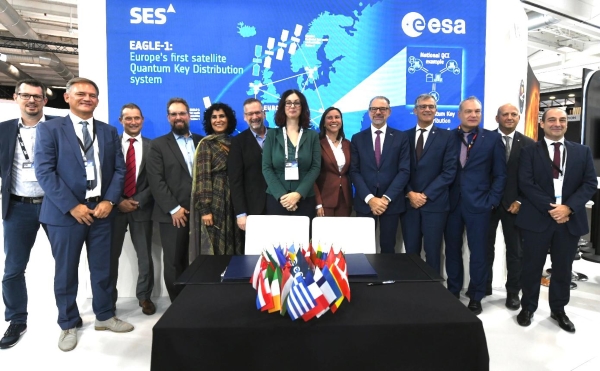 Credit: ESA / Ph. Sebirot
Credit: ESA / Ph. Sebirot
On Thursday 22 September 2022, Luxembourg satellite company SES S.A. signed a contract with European Space Agency (ESA) to co-develop Eagle-1 satellite, the first space-based quantum key distribution system in Europe, with support from the European Commission.
In today’s increasingly digital world, cybersecurity is of paramount importance, especially to avert any disruption of essential supplies such as power and water. In this regard, Eagle-1 will demonstrate the feasibility of quantum key distribution technology – which uses the principles of quantum mechanics to distribute encryption keys in such a way that any attempt to eavesdrop is immediately detected – within the European Union (EU) using a satellite-based system. To do so, the system will build on key technologies developed under ESA’s Scylight programme, with the aim of validating vital components supplied within the EU.
Eagle-1 will validate quantum key distribution technologies from low Earth orbit to the ground and provide valuable mission data for the development and deployment of the European Quantum Communication Infrastructure (EuroQCI), which will be integrated into the European secure connectivity system. It will allow the EU to prepare for a sovereign, autonomous cross-border quantum secure communications network.
Overall, the satellite will pave the way towards an ultra-secure network that relies on the laws of quantum mechanics to keep information safe, significantly boosting European autonomy in cybersecurity and communications.
The quantum key distribution system will initially use an upgraded optical ground terminal from the German Aerospace Centre (DLR) alongside a new optical ground terminal to be developed by a team from the Netherlands. The Eagle-1 platform satellite will be operated by Luxembourg-headquartered SES. Other ESA Member States involved in the project include Austria, Belgium, the Czech Republic, Italy and Switzerland. SES is leading a consortium of more than 20 European companies.
The Eagle-1 satellite is due to launch in 2024 and will then complete three years of in-orbit validation supported by the European Commission.
Josef Aschbacher, ESA Director General, said: “European space innovation has gained strong momentum both from a technology perspective and in terms of commercialisation. It allows us to develop and implement next-generation, future-proof projects in space across critical domains like secure communication, next-generation networks and cybersecurity. Led by ESA, partially financed by the European Commission and implemented by SES, Eagle-1 is a major step towards making the secure and scalable European Quantum Communications Infrastructure a reality.”
Elodie Viau, Director of Telecommunications and Integrated Applications at ESA, said: “In today’s increasingly interconnected world, keeping information secure is paramount. Robust encryption keys as well as technologies enabling their secure distribution are vital to this endeavour. We are proud to forge this partnership between ESA and a consortium led by SES to create the Eagle-1 highly secure and autonomous quantum key distribution system. ESA enables the European space industry to succeed by federating industry around large-scale programmes, achieving competitive leaps forward.”
Steve Collar, Chief Executive Officer of SES, said: “European security and sovereignty in a future world of quantum computing is critical to the success of Europe and its Member States. We are proud to leverage our multi-orbit credentials and our innovative platforms and solutions in partnership with ESA, the European Commission and the Luxembourg government to advance quantum communications and develop the Eagle-1 system to support secure and sovereign European networks of the future.”








